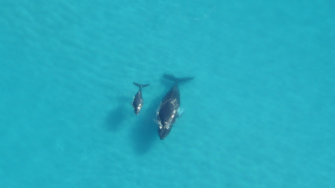
Date: Tuesday, October 6, 2015
Project: Eastern Australian Waterbird Survey
Observer: Terry Korn
We left a very hot Sydney behind us, grateful to be heading north along the coast and away from the mid thirty temperatures, high humidity and smog which was immediately apparent against the Blue Mountain backdrop as we gained height from Bankstown airport.
The first day of this survey is always a joy as we fly at low level along the magnificent northern NSW and southern Queensland coast where golden beaches and jewel seas blind. We only survey a few wetlands and their waterbirds in the coastal sections on the eastern side of the Great Dividing Range of bands 4, 5 and 6. So there is plenty of time to be thrilled by one of nature’s great migrations – that of the humpback whales as they move to the southern ocean for their feeding frenzy after giving birth to a new generation in Hervey Bay. This year the weather conditions were sublime and the whale sightings frequent after our very first cow and calf off Anna Bay to the last group at the mouth of Morton Bay. Pods of various sizes were spread right along this area, some within 100m of the shore and others kilometres off the coast. Many of these beautiful animals were leaping into the air, others lolling on their backs waving large flukes and others still, milling in large family groups.
While whales occupied much of our time we also saw many bait balls of fish along the big beaches but no sharks of note other than a lone Hammerhead. Manta rays, Stingrays, and dolphins are common along this stretch of the coast while in dugong and turtles move in the shallows of Morton Bay.
Cow and calf in north Morton Bay. Photo: Terry Korn
Flying this section of the coast emphasises Australia’s fixation with its eastern shore and subsequent impacts. Each year more development is evident with natural areas becoming scarcer, especially in the far north coast of NSW, southern Queensland border areas, Morton Bay and the Sunshine Coast. National parks may have saved the day in many areas.
